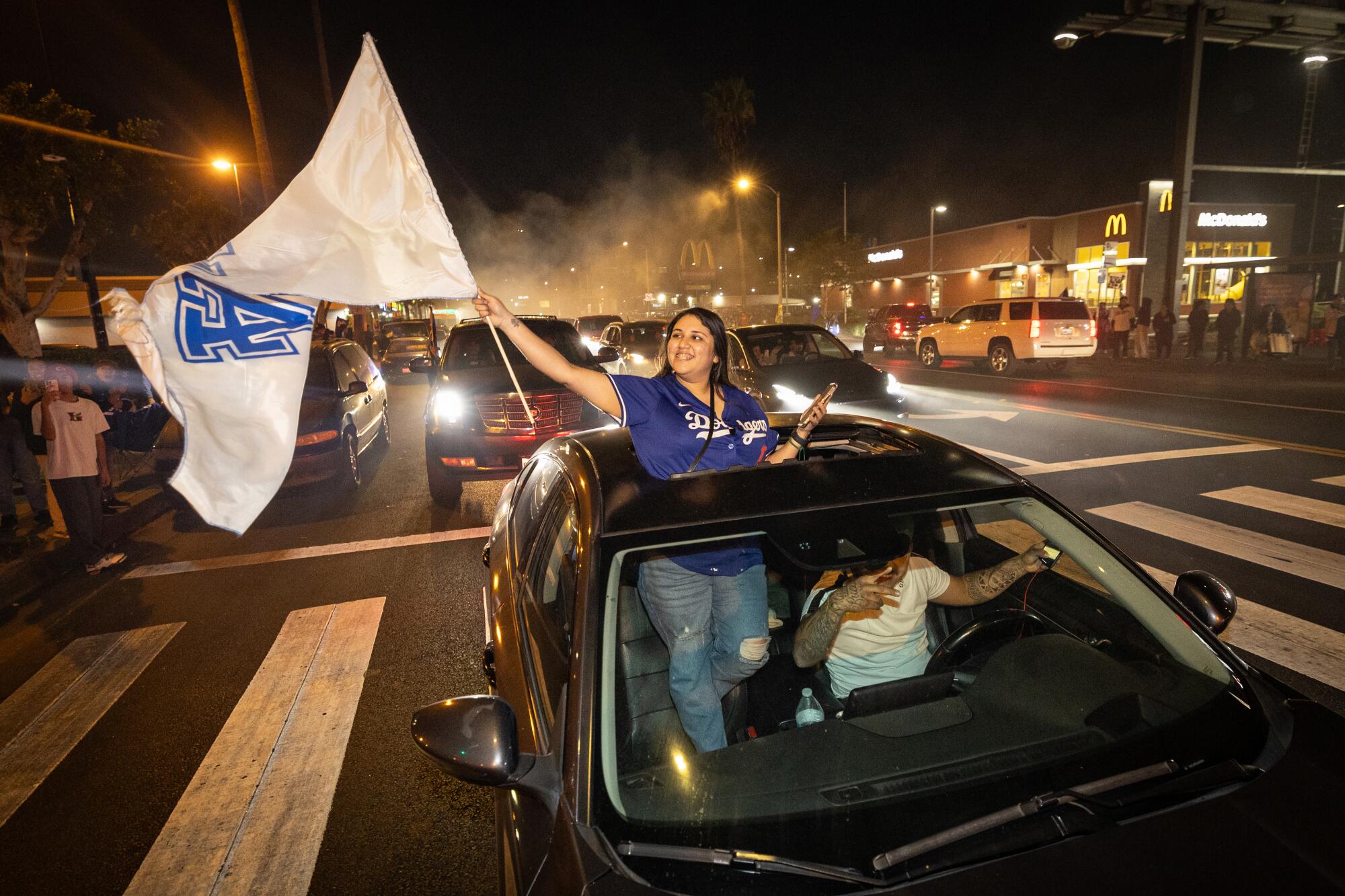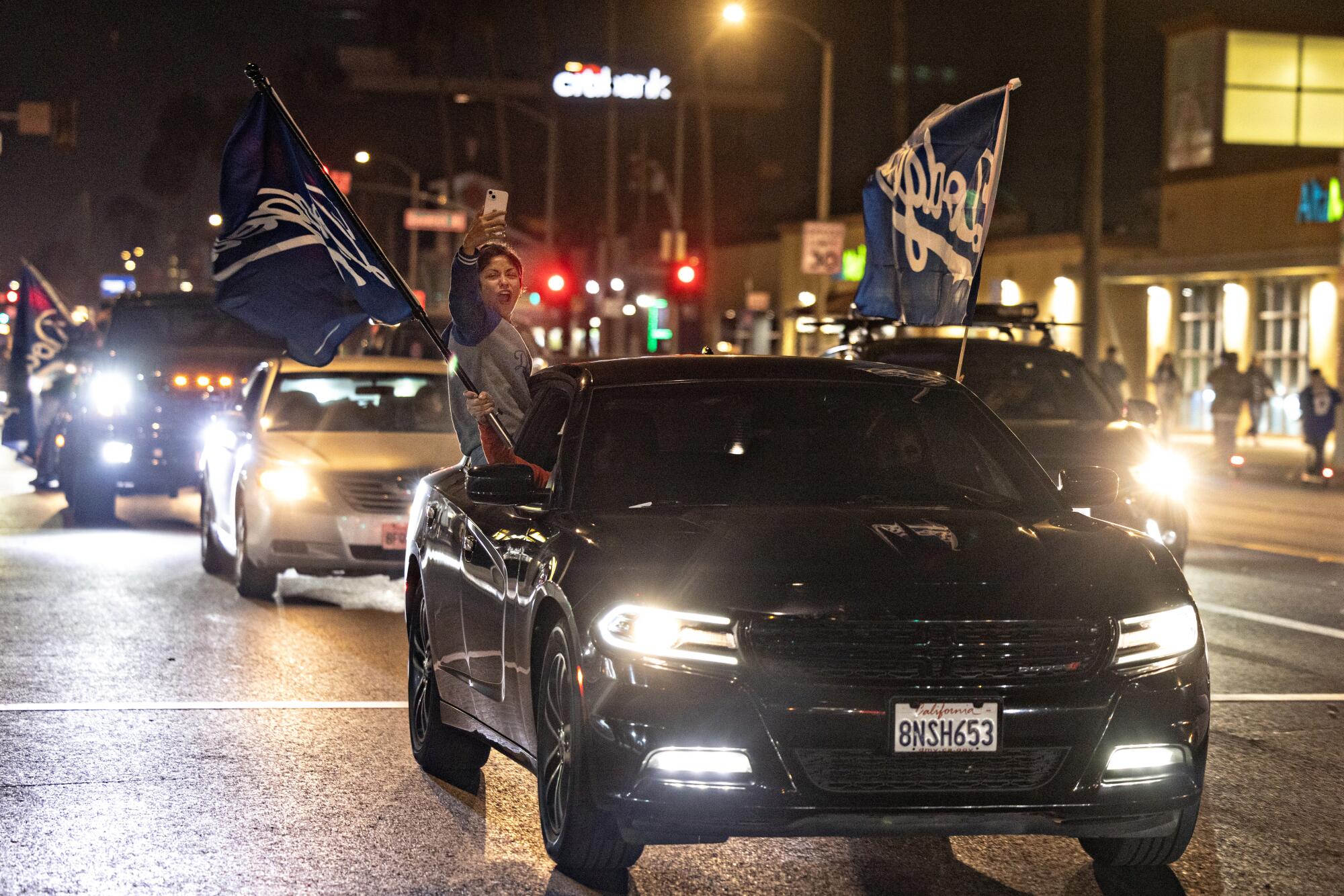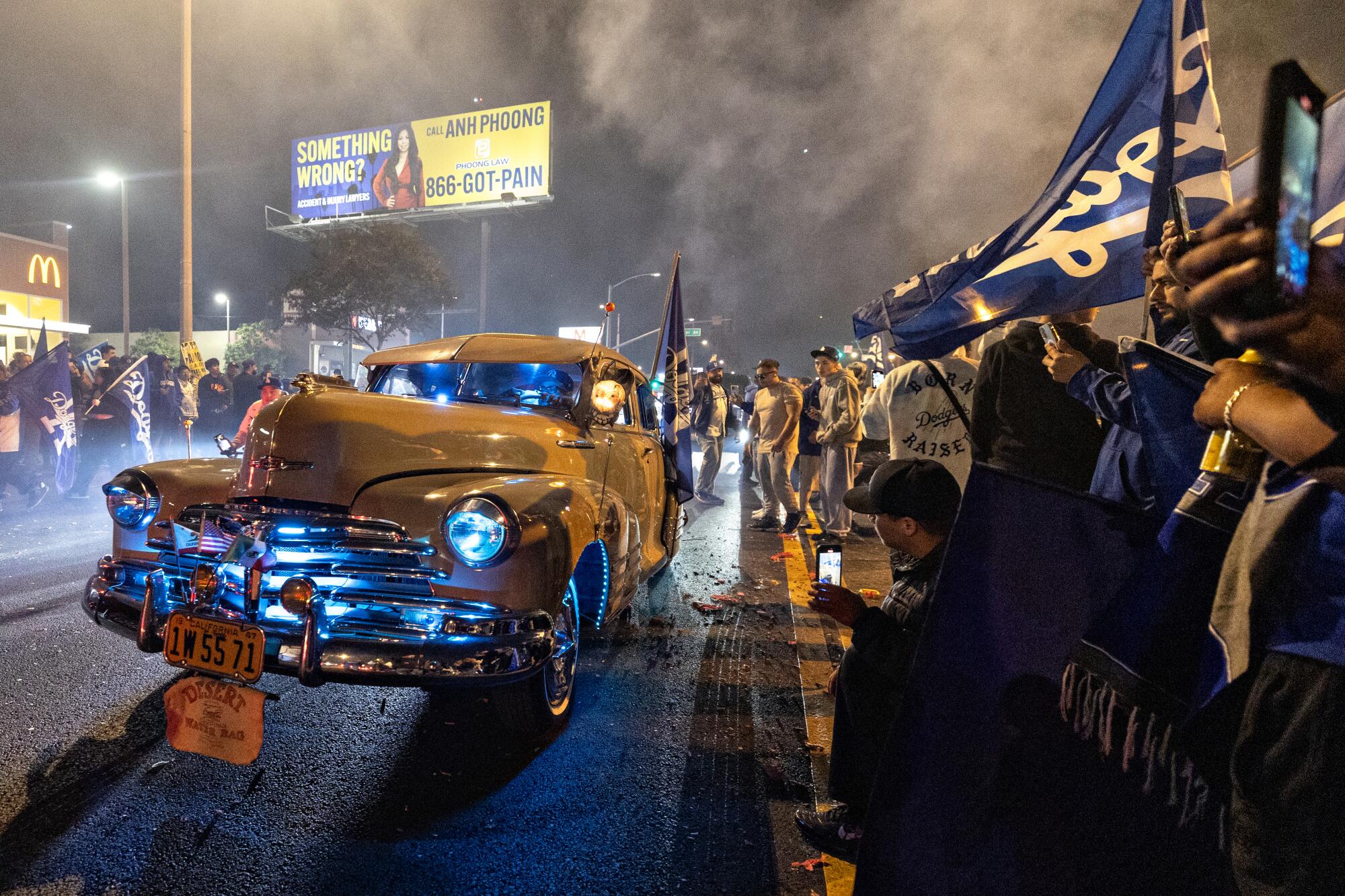-
As Trump’s Tariffs Nudge Canada Toward Free Interprovincial Trade, Gerard Comeau Gets His Revenge - 6 mins ago
-
Woman Gets Manicure—Doesn’t Realize Small Detail That Changes Everything - 15 mins ago
-
Ex-DEA agent charged with pointing gun at co-worker, motorist - 34 mins ago
-
Make America Healthy Again (MAHA) Needs Teeth—Literally | Opinion - 50 mins ago
-
Attack on Aid Convoy in Sudan Kills 5, U.N. Says - 51 mins ago
-
California freshwater fish found to be teeming with parasites. How to keep from getting sick - about 1 hour ago
-
Xi Jinping Reluctant to Meet ‘Unpredictable’ Trump: Report - about 1 hour ago
-
Why South Korea’s New Leader Name Checked North Korea but Not China - 2 hours ago
-
Florida Pastor In U.S. For 26 Years Detained By ICE at Immigration Appointment - 2 hours ago
-
Now the President Is an Art Critic - 2 hours ago
Ain’t no party like an East L.A. Dodgers party
They celebrated in Highland Park and the San Fernando Valley, across Sunset Boulevard and at Chavez Ravine and anywhere Dodgers fans exist on this big blue marble called Earth.
But really, the only place to be the night the Blue Crew won their eighth World Series was East Los Angeles.
As the team marched through the Fall Classic against the hated New York Yankees, I wanted to see fans go crazy in the Mexican American heart of the Southland. On the Atlantic Boulevard corridor between Whittier and Olympic boulevards, TV news helicopters have captured for decades the pachangas — shindigs — that spontaneously erupt any time the Dodgers, Lakers or Mexican men’s national soccer team win a big game.

Fans celebrate the Los Angeles Dodgers win over the New York Yankees on Whittier Boulevard in East L.A. on Oct. 30, 2024.
(Jason Armond / Los Angeles Times)
The partying was already so exuberant after the first three Dodgers victories — street takeovers and cruising, loud bandas and louder fireworks — that the Los Angeles County Sheriff’s Department blocked off the area during Game 4 and announced it would do the same for Game 5.
How would fans react?
I showed up at the bottom of the first inning at Paradise Sports Bar on Atlantic, a stone’s throw from Olympic. A mural of Vin Scully in a Lakers jersey and Kobe Bryant in a Dodgers jersey decorated the outside. Inside, handmade cardboard circles with the Dodgers logo surrounded by crystals hung from the wall.
The crowd was already downbeat. The score was 3-0, Yankees.
A special guest was with me: my 73-year-old dad. He had insisted on going, “just to see” what might happen. When I said maybe it was better if he stayed home, in case things got out of control, Papi scoffed.

Fans celebrate the Los Angeles Dodgers win over the New York Yankees on Whittier Bouleavard in East L.A.
(Jason Armond / Los Angeles Times)
“Mexicans will get crazy,” he said, “but they’re not going to be stupid.”
Paradise bartender Johanna Duque, 48, cracked open a Negra Modelo for me and a Coke for my dad, who used to come here when he was a borracho — a drunk — decades ago.
She asked where we were from, then why we came all the way from Anaheim. When I responded that we wanted to be part of the Eastlos crowd after a Dodgers championship, Duque laughed and shook her head.
“Oh, you want to see the desmadre,” the Guatemalan immigrant said in Spanish. “It’s going to be horrible.”
It seemed hopeless at first, as the Dodgers fell behind 5-0 after three innings. Worse, some pocho kept picking morose arena rock in English and Spanish — Pink Floyd and the Doors, Enanitos Verdes and Caifanes — from the digital jukebox that drowned out the baseball broadcast.
To distract from that din, my dad — wearing a Dodgers jersey and hat — rattled off a bunch of long-gone bars he used to patronize on the Eastside. El Regis and La India Bonita. Lisa’s Place. The Flamingo Inn.

(Jason Armond / Los Angeles Times)
“Hey, isn’t Steve Garvey running for something?” he suddenly asked. “I want to vote for him!”
More people streamed in.
“Hope never dies, baby!” Duque yelled in Spanish above “You Oughta Know” by Alanis Morissette. As if on cue, the Dodgers scored five unearned runs in the top of the fifth inning, waking up the comatose Paradise crowd.
I put on “Por Una Mujer Casada” by Banda El Recodo to brighten up the mood and stepped outside to see if law enforcement had blocked off Atlantic yet.
Not yet.
Back in the bar, Francisco Salas washed down a plate of charbroiled chicken with a Dos Equis.
“It’s one thing to celebrate but another thing to vandalize,” the Jalisco native said in Spanish. “If they cruise calmly, that’s fine. But when they do this” — he spun his finger in a circle — “that’s when the police shut everything down.”
“What do you think?” Duque asked me. I said it would be cool if the Sheriff’s Department blocked off Atlantic, but only if it allowed people to take it over, a la a block party.
She shook her head again.
“Have you been here? It won’t be pretty. Because the problem is people don’t respect authority. Les vale.” They couldn’t care less.
East L.A. native Diana Parra was at Paradise with her friend Jorje Acosta, whom she easily convinced to come down from Palmdale for Game 5.
“We want to be here to see what I call ‘the parade,’” said the 29-year-old Parra. “Not the official one but the Whittier one! You have to be with other Dodger fans. It’s a feeling of home.”
“The last championship, we couldn’t really celebrate because of COVID,” said Acosta, 42. He wore a black-and-yellow Dodgers jersey with Kobe’s 24 on it. “If we win, we deserve this.”
The two screamed in delight along with the rest of us as the Dodgers scored two runs in the top of the eighth.
I stepped outside in the bottom of the ninth. Atlantic was now completely sealed off from Olympic to just north of Whittier. A group of CHP officers looked down at a smartphone streaming the game, and waited.
The fireworks exploded the moment Walker Buehler struck out Alex Verdugo to win the Series. Inside Paradise, “I Love L.A.” blasted as everyone hugged and ordered more cubetas (buckets of beer).

(Jason Armond / Los Angeles Times)
I grabbed my dad and walked up Atlantic toward Whittier. The pachanga was on.
People poured out of businesses and homes, hugging and high-fiving friends and strangers. Honking cars cruised down Whittier up to the blockade, then did U-turns. The air became thick with white smoke as people burned out their tires while stuck in traffic or fired off bottle rockets from the back of trucks.
Hundreds of people turned into thousands within minutes. We all marched east, taken over by a communal sense of ecstasy that we didn’t know what to do with, except to do it together.
What blockade?
“People do get out of control,” Salvador Rodriguez said in Spanish at the corner of Amalia Avenue. He lives just down the street. “But the people want to celebrate — this is the sport of Los Angeles.”
Nearby, Parra and Acosta were waving to the cars, while Ernesto Montes and David Perales of Maywood filmed the scene with their smartphones.
“I’m here to witness greatness,” said Montes, 26, before shouting “Dodgers!”
“L.A.’s had a tough time,” added Perales, 23. “Let’s show the world how we run L.A.!”
People lined the streets waving Dodgers flags bought from vendors, matching the Dodgers gear they all wore: shirts and ponchos. Jackets and sombreros. Pajamas and scarfs. Even onesies or handkerchiefs for dogs.
Gustavo Flores and his wife, Sandy, stood in front of a Taco Bell on the corner of Whittier and Goodrich boulevards with their two young children. The 3-year old, Katalina, slept on her father’s shoulder.

(Jason Armond / Los Angeles Times)
“We want to show them history,” said Gustavo, 28, wearing a smile as wide as the grill of a Chevrolet Impala.
“We’ve been watching games our entire lives. We’ve been stressing all night. Now, we get to be happy!” added Sandy, 25.
Freddy Sanguino of Hacienda Heights wore a Freddie Freeman jersey as he walked in the middle of Whittier Boulevard. He held up a miniature World Series trophy and allowed people in cars to take selfies with him.
“I can’t even explain how good this feels,” Sanguino said. “’Twenty-four is going to be twice as big as anything ever! This is for all the Latinos! This is for Vinny! This is for Fernando!”
My dad and I ended up in front of the Commerce Center, where we ran into three sets of cousins from his side of the family.
Among them were Susana and Diego, the oldest and youngest children of my Tío Santos. They carried a banner with images of Mookie Betts, Shohei Ohtani, Kiké Hernández and Max Muncy that read, “Happy Heavenly Birthday Santos.”
My Tío Santos was a diehard Dodgers fan who died in early September of a heart attack. At his funeral, my cousins displayed an Ohtani jersey near his casket. Friday, the day of the Dodgers’ official parade and Fernando Valenzuela’s birthday, mi tío would have turned 77.
“’Excited’ doesn’t even cut it, Gus,” Susana told me. “There is no word in the dictionary that could describe the joy that my father would’ve felt today. But a Dodgers championship was simply the way it had to be.”

Dodgers fans light fireworks to celebrate the Los Angeles Dodgers’ win against the New York Yankees in Game 5 of the World Series on Wednesday.
(Michael Blackshire / Los Angeles Times)
The fireworks were still firing two hours after the final out when my dad and I left. People were still arriving.
The scene was far uglier in other parts of Los Angeles. Crowds burglarized or vandalized stores downtown. In Echo Park, idiots tagged a Metro bus before setting it on fire and burning it down to its base. Incidents like these will lead to media coverage that gives further grist to those who insist L.A. is a hellscape that can’t be saved.
Those won’t be my memories. What my dad and I experienced on Whittier Boulevard was L.A. at its finest. I’ve never seen people so happy, so relatively calm, so united. They burst with joy, and no blockades were going to stop them.
We walked down Amalia to Olympic, where we had parked. Atlantic was eerily quiet. Tape blocked off almost everything, including a Shell station that’s been a focal point for celebrations in the past. My dad had looked forward to seeing bandas playing there while people danced in front of gas pumps.
“They took away the tradition!” he said in Spanish, with disgust. “Where’s the banda? Those are the things we need so that la raza can enjoy themselves.”
A rocket blew up above us.
“Sometimes, it is our fault,” Papi said with a shrug. “Sí hacemos escándalo demás.”
We do go overboard.
Another firework rang. He now smiled.
“Oh well!”
Source link



















